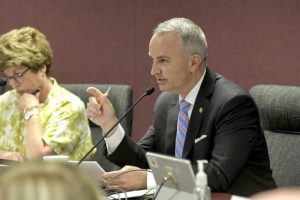Could Missouri implement merit-based teacher pay?
The Missouri legislature is considering merit-based pay to increase teacher salaries and improve the quality of teaching in the classroom.
“If we just keep raising the floor for everybody with no…

The Missouri legislature is considering merit-based pay to increase teacher salaries and improve the quality of teaching in the classroom.
“If we just keep raising the floor for everybody with no accountability and no ability to determine who’s good and who’s not, I’m not sure that does a tremendous amount of good for students,” said Senate President Caleb Rowden, R-Boone. “There’s any number of metrics out there that can help us define that.”
His counterpart in the House said the same.
“It’s a flawed system that rewards time served instead of output and innovation,” House Speaker Dean Plocher, R-Des Peres, argued. “Teaching is difficult, and our state needs to reward teachers for success so our children have access both to great teachers and choices for education.”
Teachers’ unions – like the NEA – generally oppose merit-based pay. Critics often argue finding an objective litmus test for teachers’ efficacy would be too difficult, despite the consensus that excellent teachers should be compensated accordingly. The Missouri State Teachers Association (MSTA) also opposes the policy.
However, a 2017 study by Vanderbilt University showed merit-based pay could increase student achievement.
“We found that the presence of a merit pay program was associated with a modest, but statistically significant, positive effect on student test scores,” researchers reported. Even the Missouri Board of Education president told local media he supports merit-based pay in the state.
Meanwhile, Rep. Ed Lewis, R-Moberly, has introduced a bill that would raise teacher salaries to $38,000 by the 2026-2027 school year.
The NEA has claimed the average starting salary in the state is $33,200, but the real number from the state is $38,000, according to James Schuls, director of research and education policy fellow at the Show-Me Institute.
“We need to actually be looking at the information,” said Schuls. “You might still decide that it’s too low and that we need to take action in this state, but let’s get the real numbers out there. Not these factually incorrect numbers that are reported by the NEA.”
Schuls also recommends alternative teaching licensure as an avenue to bring quality teachers into the classroom.
“Quality teachers simply cannot be identified exclusively by their licensure route or exam scores,” Schuls wrote in a research paper with co-author Julie Trivitt of the University of Arkansas.
“[L]et local schools hire the individuals they think are the best for the job, regardless of certification,” Schuls concludes.
This week marks just the third week of the legislative session for Missouri lawmakers, who were sworn in Jan. 4.



